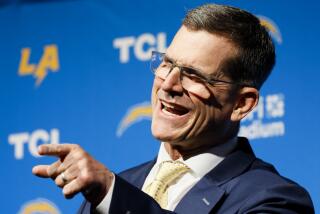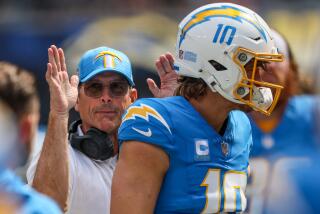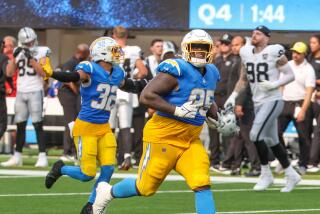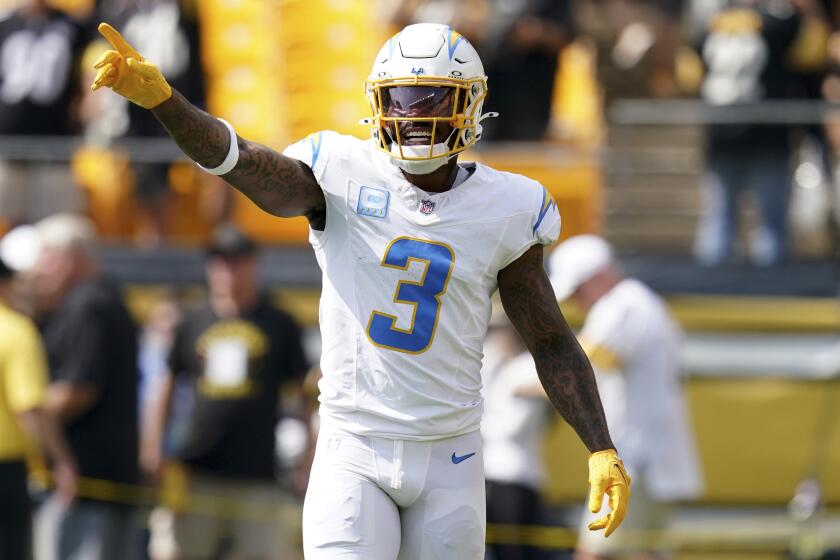He Goes From Toast to Ghost, but Patterson Still Feels Special
Most defensive backs would cringe if they were nicknamed Toast, as in: âHe was burned on the play like a piece of toast.â
But Raider cornerback Elvis Patterson took pride in being called that by former New York Giant Coach Bill Parcells.
Itâs all in the interpretation.
Patterson said he was the Toast of New York while playing for the Giants in 1984-87. However, Pattersonâs critics said it was because he was easy to burn on pass defense.
âI was the Toast of the East Coast because I made big plays, but when I came to California, they tried to use it as a negative thing,â Patterson said. âI always told people not to judge me. Donât say I was burnt toast. Everybody that plays corner is going to get beat sooner or later.â
But Patterson has gotten a new nickname since joining the Raiders last season. His teammates call him Ghost because he materializes out of nowhere to make tackles on special teams.
Patterson is so fond of his new nickname that he wears a large gold pendant shaped like the cartoon character Space Ghost, with the word Ghost encrusted in diamonds.
âIâm a reincarnation of the Toast,â Patterson said. âWhen I was on the East Coast, being the Toast was a big thing. Now Iâm on the West Coast, and I thought the Ghost was a more appropriate nickname. Iâve resurfaced like a ghost.
âBasically a lot of people donât see me on the field,â Patterson continued. âBut when the big play needs to be made, Iâm there.
âI said last year that I was going to take special teams to another level, and so far Iâm doing it. Iâm showing people that special teams can have a big impact on games.â
The leading tackler on the Raidersâ special teams, Patterson almost made a big impact during the 23-20 overtime victory in Seattle last Sunday when he returned a punt 100 yards for an apparent touchdown after the Seahawks failed to pursue him because they thought the ball had been downed in the end zone.
But Patterson, who prides himself on his knowledge of the rules, hadnât downed the ball, and he sprinted down the sideline as the Raider offense and the Seahawk defense were taking the field.
However, the officials penalized both teams for having too many men on the field and nullified Pattersonâs run. He had made a similar play the previous week in the Raidersâ 21-13 loss to the San Diego Chargers, returning a punt 108 yards for an apparent touchdown, but the officials ruled that the ball had been blown dead.
âIâd had a touchdown called back the week before, so I told the officials before the (Seattle) game that I wanted to play the ball,â Patterson. âEven if they touch the ball and the whistle hasnât blown, itâs still a live ball. The way to down a ball is to pick it up and give it to an official. If you touch it and walk away, the ball is still live and you can still play it.â
Patterson came close to making another key play when he almost blocked a punt against the Seahawks. Only an illegal block prevented him from getting to the ball, and although it was obvious from TV replays that Patterson had been held, no penalty was called.
âI know that before a team lets me block a punt, theyâre going to hold me and pull me down,â Patterson said. âTeams donât care if they have to scratch me or punch me or pull me down. Theyâre dragging me down and almost breaking my back. Theyâre devising special team schemes around me.
âItâs the same thing they do when they design schemes (to stop) Lawrence Taylor or Howie Long or Greg Townsend from getting to quarterbacks.â
Patterson said he canât get any holding calls because back judges, who are responsible for calling holding, are too concerned with watching the punter.
Although heâs playing well enough to gain Pro Bowl recognition as a special teams player, Patterson almost disappeared from the NFL after being cut by the Giants one game into the 1987 season.
A free agent from Kansas, Patterson was signed by the Giants in 1984, and he spent the first three seasons of his career in New York. During the Giantsâ drive to Super Bowl XXI, he led the defensive secondary in tackles and also intercepted a pass in the Giantsâ 39-20 Super Bowl victory over the Denver Broncos.
But Patterson was waived by the Giants after he walked off the field during the opening game of the 1987 season against the Chicago Bears, on a Monday night, because he was suffering from cramps. Management thought he could have played, and Patterson was released the next day.
âI was hurt,â Patterson said. âI thought they could have traded me because I was a hot item. But they tried to blackball me out of the league. How can you go from being one of the top cornerbacks in the league, and all of a sudden nobody wants you?
âIt hurt me when I left, and it hurt them when I left. I was beginning to make a name for myself. I was becoming real big on the East Coast. I went from that to nothing.â
Signed by the San Diego Chargers as a replacement player during the NFL playersâ strike, Patterson made an immediate impact when he intercepted a pass by Raider quarterback Vince Evans and returned it 75 yards with 18 seconds left to lead the Chargers to a 23-17 victory at the Coliseum.
After starting three replacement games for the Chargers, he started eight more games following the strike, then spent the next two seasons in San Diego before signing with the Raiders as a Plan B free agent in 1990.
After earning a Super Bowl ring with the Giants, Patterson would like to earn a second with the Raiders.
âI put (the Giant ring) on occasionally,â Patterson said, âbut the main thing is I want a silver and black (Super Bowl) ring, and Iâll do whatever it takes to get it.â
More to Read
Go beyond the scoreboard
Get the latest on L.A.'s teams in the daily Sports Report newsletter.
You may occasionally receive promotional content from the Los Angeles Times.










